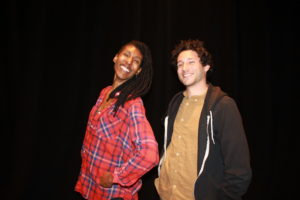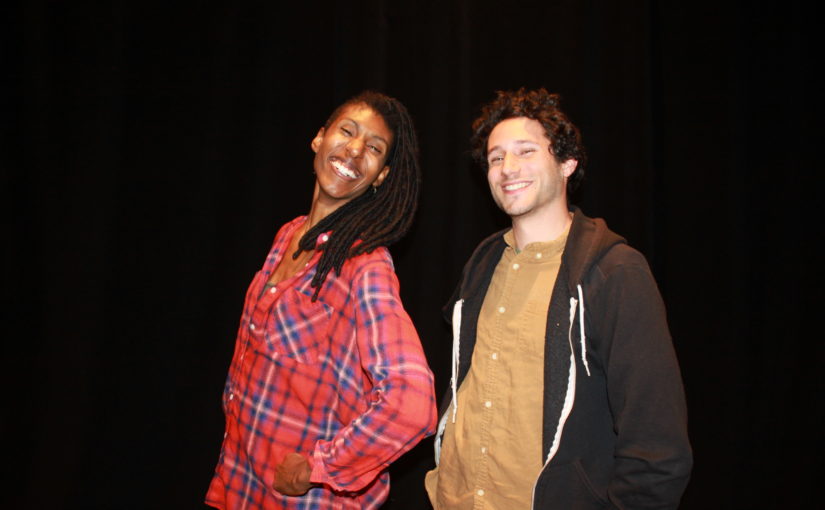Sex: something that most people do not openly talk about. Consent: something that many find awkward to ask during the act. These topics are often awkward and uncomfortable at first, but it does not mean they should not be talked about to educate people more.
On Oct. 24, Campus Attractions had an interactive event called “Sex Signals,” sponsored by Spotlight Committee. This event was a comedic and educational improv session performed and informed by two speakers, Tiffany Mitchenor and David Seeber.
They began by talking about how most people have been given mixed signals when it comes to talking about sex. Some people say, “Don’t have sex.” Others say, “Sex is great.” And then there’s the extremists with the phrase, “Sex will kill you.” With these mixed signals, the speakers transitioned into asking the audience if they had a sex education class growing up and what they talked about within that course.
“We talked about abstinence,” a student attending said. While another said, “Types of STDs.”
The speakers said they had similar experiences to learning abstinence in a course and that it was the typical putting a condom on a banana class, although many explained how they did not even have that taught in the course. They explained how we are not taught how to initiate relationships and that many result to porn for education, but “porn does not teach you how to hook up,” Mitchenor said.
They also explained that relationships and “hooking up” differ from person to person. This transitioned into a skit about a college party and people trying to “hook up.” Throughout this skit, they would stop and ask the audience questions about how their character should be acting. For instance, “Should the girl be flirty or intense?”
This led to the term “friend-zone” and Mitchenor shook her head saying, “Being nice to someone shouldn’t always mean sex,” then continued to explain, “We are not sex faucets.”
Mitchenor and Seeber went on to ask the audience what are some terms that correlate with a healthy relationship. People threw out words like “trust,” “personal space” and “communication.” When asked about an unhealthy relationship, people answered “lack of communication” and “lack of trust.”
After this, they explained how people today believe that men should always want sex and if the man does not then it is not normal. While with women they are called “slut” whether or not they are having sex and “stupid slut” if they are raped. Along with these stereotypes, women are supposed to be “emotional” or a “housewife” while a man is supposed to be the “provider” and “macho.”
After these explanations, they did a scenario where the audience should hold up a “STOP” card if the situation becomes uncomfortable for either person involved. They had it so they were in the Wellness Center and a male student approached a female student in a very “creepy” matter, where he was looking at her like an object.
Many didn’t hold up their card until touching was involved. Although, some held their card up once the person invaded the other’s personal space. “If it happens around us a lot, we just get used to it,” Mitchenor explained.
Mitchenor and Seeber followed by saying this topic of seeing someone as an object is the sign people should be looking for. Someone who feels entitled to sex is who people should be worried about. They went on to say how people should not have to take a self-defense class to be prepared when in reality people should be taught to ask for consent.
The next skit was a college interview where a student journalist was interviewing a student whose friend had been accused of raping another student. After this skit they went on to talk more about consent.
When alcohol is brought into the situation, lines tend to get blurred. But, they explained, if someone is intoxicated you cannot truly get consent. Mitchenor gave the example of: if a friend came up to you (heavily intoxicated) and said punch me in the face. If you were a good friend, you would know not to punch them in the face because they are drunk.
They then explained that even after being in a relationship consent does not end. They also believe that the initiator of sex should be the one to ask if the other person is comfortable or not.
People tend to say asking for consent can “kill the mood” or “make it awkward,” but the speakers explained that it is a win/win situation when asking for consent. Either the person says yes and the both of you are having sex, or they say no and you respectfully take it and no one is a rapist.

The Improv speakers, Tiffany Mitchenor and David Seeber, at NDSU event, Sex Signals.
Now, what happens if you are faced with a survivor of sexual assault/rape. Most people automatically ask, “Well, what did you do though?” which automatically implies that they could be in the wrong and could discourage them from speaking out. Instead, people should be reassuring them it is not their fault, be a support system if they would like to go forward with a prosecution and if they would not be supportive for that as well and overall, saying “I believe you” to this survivor.
They went on to explain the problems of how people in society are acting. Women are taught to never be alone and to essentially not trust men. Men are taught if they say they are raped they are not masculine.
The speakers explained that some people have sex, some people have not and some do not plan to. But, they believe everyone should be informed because of those around you and because, although you may decide not to have sex now, that could change. So, they want to provide everyone with information about sex.
Mitchenor and Seeber ended the event by giving the three things people should be taking away from the Sex Signals interactive improvisation. One, make consent the norm. Two, support survivors no matter who they are, whether they are female, male, LGBT, etc., support survivors. Three, be a great “upstander” instead of being a bystander; stand up for one another and be an upstander.
